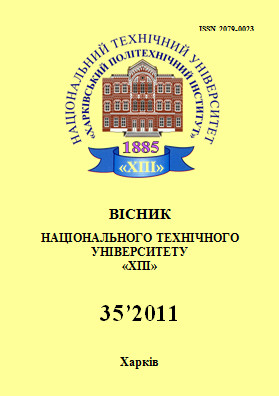Оцінка якості дистанційного курсу
DOI:
https://doi.org/10.20998/%25xAbstract
Пропонуються методи і показники оцінки якості дистанційного курсу. Важливими оцінками є кредитність курсу та рівень інтерактивності курсу. Основними вимогами до побудови тестів є надійність, валідність та дискримінативність. Зроблені висновки про ефективність оцінок.
References
http://science.kharkov.ua/education/distance-education/distance-education-problems.html.
Interactive or non-interactive? That is the question! An annotated bibliography. Journal of Distance Education/ Zirkin, B. & Sumler, D , 10(1), 95–112.
Building interactivity into web courses: Tools for social and instructional interaction. Educational Technology / Gilbert, L., & Moore, D. R. (1998)., 38(3), 29–35.
Distance teaching with a vision. Paper presented at the Biennial Conference of the Australian Society for Educational Technology, Melbourne / Edmonds, R. (1996, July).
From a distance: Student voices from the interactive video classroom. TechTrends, 42(6), 20–24. / McHenry, L., & Bozik, M. (1997).
Online Journal of Distance Learning Administration, Volume III, Number II, Spring2000 State University of West Georgia, Distance Education Center.
Офіційний вісник України вiд 30.04.2004. – 2004 р., № 15, стор. 241, стаття 1078, код акту 28528/2004 Положення про дистанційне навчання в Україні. Наказ МОН України.
Downloads
Published
How to Cite
Issue
Section
License
Copyright (c) 2016 Вісник Національного технічного університету «ХПІ». Серія: Системний аналiз, управління та iнформацiйнi технологiїAuthors who publish with this journal agree to the following terms:
- Authors retain copyright and grant the journal right of first publication with the work simultaneously licensed under a Creative Commons Attribution License that allows others to share the work with an acknowledgement of the work's authorship and initial publication in this journal.
- Authors are able to enter into separate, additional contractual arrangements for the non-exclusive distribution of the journal's published version of the work (e.g., post it to an institutional repository or publish it in a book), with an acknowledgement of its initial publication in this journal.
- Authors are permitted and encouraged to post their work online (e.g., in institutional repositories or on their website) prior to and during the submission process, as it can lead to productive exchanges, as well as earlier and greater citation of published work (See The Effect of Open Access).

